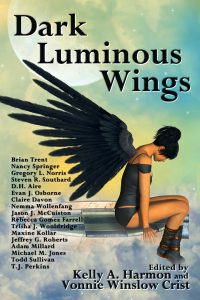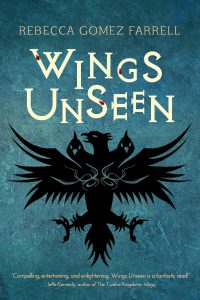Every now and then, do you meet someone who just plain gets more done than you do, someone who does it all? These people somehow cram way more into a 24 hour day than you possibly could. They make you feel like you’re living in slow motion while they jet around at hypersonic speed. I felt that way when I encountered author Rebecca Gomez Farrell, who has a story in the upcoming anthology, Dark Luminous Wings. Luckily for you and me, she had four minutes and thirty seven seconds to spare recently, and answered some interview questions.
 Rebecca Gomez Farrell writes in all the speculative fiction genres she can conjure up. An associate member of the Science Fiction and Fantasy Writers of America, Becca’s shorter works have been published by The Future Fire, Beneath Ceaseless Skies, and Typehouse literary magazines, and Pulp Literature among other outlets. Meerkat Press just published her debut fantasy novel, Wings Unseen, in August. Her food and drink blog, theGourmez.com, has garnered multiple accolades and influences every tasty bite of her fictional worldbuilding. In the past, she has also contributed her photography skills and commentary to her love of General Hospital, which has been in her blood since the womb. She credits soap operas for heightening her fiction’s romantic elements and appreciating the layers generational history can add to her work.
Rebecca Gomez Farrell writes in all the speculative fiction genres she can conjure up. An associate member of the Science Fiction and Fantasy Writers of America, Becca’s shorter works have been published by The Future Fire, Beneath Ceaseless Skies, and Typehouse literary magazines, and Pulp Literature among other outlets. Meerkat Press just published her debut fantasy novel, Wings Unseen, in August. Her food and drink blog, theGourmez.com, has garnered multiple accolades and influences every tasty bite of her fictional worldbuilding. In the past, she has also contributed her photography skills and commentary to her love of General Hospital, which has been in her blood since the womb. She credits soap operas for heightening her fiction’s romantic elements and appreciating the layers generational history can add to her work.
Here’s the interview:
Poseidon’s Scribe: How did you get started writing? What prompted you?
Rebecca Gomez Farrell: I’ve wanted to be a writer since childhood. Other than a flirtation with being a veterinarian—cut short once I realized blood was involved—writer has always been my chosen profession. I was writing horror poetry during family vacations as a kid, and I still have my short stories from the second grade. Ghost cats, mean older sisters, and an ominous presence in the attic were reoccurring characters throughout elementary school. I’ve always loved fantasy and horror. Apparently, a little blood is okay with me as long as it’s fictional.
P.S.: Who are some of your influences? What are a few of your favorite books?
R.G.F.: I’m deeply influenced by the fantasy classics, especially J. R. R. Tolkien and C. S. Lewis. I love when a fictional world’s invented history informs the narrative. George R. R. Martin showed how well multiple points-of-view can be pulled off, which my novel also uses. I also take inspiration from important writers on the American experience, including James Baldwin, Mark Twain, and Kurt Vonnegut. Favorite books: The Sparrow by Mary Doria Russell, Lilith’s Brood by Octavia Butler, Banjo by Claude McKay, and the works of the authors I’ve already mentioned.
P.S.: In the fiction world, you write fantasy, romance, horror, and science fiction. In nonfiction, you write food, drink, and travel blogs as well as reviewing TV shows, movies, plays, books, and concerts. Whew! How many projects do you have going at one time, and how do you keep it all organized?
R.G.F.: Too many! That’s a constant challenge for me: prioritizing my projects. I like having my hands in different pots, but I’ve learned to only focus on a couple at a time. I’ve transitioned away from entertainment writing and copyediting so I can focus on my fiction and my blogging. At this point, I’m cutting down on the blogging, too, because I want to use my energy for fiction for as long as I’m able to financially. But I can’t bring myself to let it go completely – I’ve worked hard for my perks like free menu previews and sample wines!
P.S.: Do you use facts and trivia picked up from your nonfiction writing and research in your fiction? If so, can you give an example?
R.G.F.: I do, in as much as any writer’s passions will end up in their works. An example would be that as I’ve honed my senses as a food and drink critic, it’s improved my worldbuilding. Food and drink are such essential parts of the human experience, whether that experience is on Earth or on a secondary world setting. Just today, I revised a Halloween-themed micro-fiction story in which the narrator is lured into an old, abandoned house by the potential for finding an amazing aged Scotch in the alcohol cabinet. Paying attention to the culinary scene also sharpens my writing’s sensuality – describing the smell of a homey chicken soup can conjure up a lot of powerful emotions.
 P.S.: Your short story, “Treasure,” will appear in the upcoming anthology Dark Luminous Wings. Eager readers can get introduced to the story with the brief description on your website. Can you tell us something about the story’s setting?
P.S.: Your short story, “Treasure,” will appear in the upcoming anthology Dark Luminous Wings. Eager readers can get introduced to the story with the brief description on your website. Can you tell us something about the story’s setting?
R.G.F.: “Treasure” is a secondary world fantasy. The action primarily takes place in Trilonea, which the protagonist, Enkid, has been taught is dangerous for people from her country to visit. But what she finds are people who live a peaceful, happy, communal existence, and that is very different from the dog-eat-dog world she comes from. The Triloneans also have a sea monster who protects them from others who may be a threat to their way of life…and Enkid must decide if she is.
P.S.: In addition to your other activities, you offer fiction editing services. Has that experience affected your own writing?
R.G.F.: Oh yes. I’m doing more critiquing than editing these days, but both exercise the same part of my brain. Letting myself loose to write a first draft without pausing to edit is difficult and slows me down. I just gave my first workshop on the basics of how to polish a manuscript for submission, and those small mistakes pop into my mind all the time as I write. It’s a challenge to turn off that voice in my head and just get words down. That’s part of why I describe myself as a slow writer. The benefit is that my drafts are very clean, even if they take me forever to get done!
P.S.: It appears you’re a significant presence on Twitter, with nearly 32,000 tweets (averaging over 9 per day) and nearly 5,000 followers. Do you believe tweeting has attracted potential readers to read your fiction?
R.G.F.: Definitely! I draw in different audiences from all my different genres of writing, and that ultimately attracts more eyeballs to my fiction. After all, wine lovers read, fiction readers enjoy a good meal, and so on. The success of that strategy was evident on my recent book tour, when I often had bookstores pulling out more chairs to accommodate the folks who came out to support me from all different aspects of my writing life, sometimes buying books for a friend if they weren’t fantasy fans themselves.
 P.S.: Congratulations on the publication of your first novel, the epic fantasy Wings Unseen. It’s getting wonderful reviews so far. What sort of readers should try it out?
P.S.: Congratulations on the publication of your first novel, the epic fantasy Wings Unseen. It’s getting wonderful reviews so far. What sort of readers should try it out?
R.G.F.: Fans of classic fantasy will enjoy Wings Unseen, because it’s a tale with a deep history and mythos that informs the narrative. If they also like multiple points-of-view and a greater focus on inner transformation than big battles, it’ll be a perfect for them. Some readers may have no stomach for misogynistic behavior, and they won’t get past the first chapter, which I understand. But if they push through, I think they’ll be rewarded with rich character arcs, fast plotting, and twists that lead to a rather optimistic take on the interplay between faith, free will, and our better natures. The light shines ever brighter through darkness.
P.S.: After writing so many short works, including short stories, blog posts, and reviews, did you find it difficult to keep focused while you wrote your novel?
R.G.F.: Ha ha, you’ve discovered why my chapters are so short! In all honestly, I don’t think those shorter forms of writing affect my focus when novel writing. But I do tend to imagine a story in terms of scenes I want to write for it. Once those scenes are written, the rest of the narrative comes together through my piecing together how to best link them to form the overarching plot. So shorter works are my natural tendency, but novel writing requires I find the connective tissue to create a larger whole.
P.S.: You’re co-organizer of the East Bay Science Fiction and Fantasy Writers critique group. Do you recommend that beginning writers join critique groups? Why or why not?
R.G.F.: For beginning writers, just getting the words down is the most important skill to work on. If the beginning writer doesn’t hate writing after accomplishing that first draft, and they want to share their story with the world, I think critique is absolutely essential. Learning how to give and take critique helps us hone our craft so readers can truly connect with the story. Without critique, that story might be obscured by the cobwebs of beginner mistakes. Don’t we want to sweep those away so readers can fully view our masterpieces? Critique is an essential part of getting our stories to the point that they shine.
P.S.: Since you first began writing, how has your writing evolved in terms of style, theme, genre, etc.?
R.G.F.: Well, I’ve moved on from ghost cats to alien-possessed Thanksgiving guests! In all seriousness, I hope I’ve gained a better grasp of plotting, as characters are always the beginning of story for me, and the plot is secondary in terms of my interest. So I’ve worked on having clear through-lines in place for my plots from the beginning of the creative process. I’ve also learned that my love of poetic prose can undermine the effectiveness of my storytelling, so I spend a good amount of time cutting my flowery phrasing down after that first draft. I’ve also been surprised to write a fair bit of humorous science fiction along the way, and I’m more and more interested in the personal essay.
P.S.: You’re working on a second novel, Natural Disasters. Care to provide any hints about what we can expect with that?
R.G.F.: Natural Disasters is a post-apocalyptic novel set in a future Earth in which seasons are no longer differentiated by weather but by the natural disaster most likely to strike within them. The remaining human population migrates from island to island based on where the natural disasters are less extreme each season. The government is composed of psychologists who’ve reduced the suicide rate by using fairy tales to discourage the development of emotional connections, so people are less distraught when a natural disaster claims another life. Oh, and it’s a paranormal romance.
Poseidon’s Scribe: What advice can you offer aspiring writers?
Rebecca Gomez Farrell: Honing your craft is as important as your passion for storytelling. Be open to learning how to become a better writer, and steel yourself for taking rejection and critique along the way. It’s all part of the process, and any true writer will want to tell their stories so well that readers will respond to their passion for it.
Thank you, Rebecca. I’ll pass on some links for you interested readers out there, but you’ll have to keep hitting the ‘update’ or ‘reload page’ button since there’s always something new for Rebecca. Find information about her new novel here. Just try to catch up with her on her website, her food, drink, and travel blog, her Instagram page, her personal Facebook page, her author Facebook page, on Twitter, at the Writers’ Meetup group she co-leads, and at the national organization where she’s the SF chapter leader.
Poseidon’s Scribe
